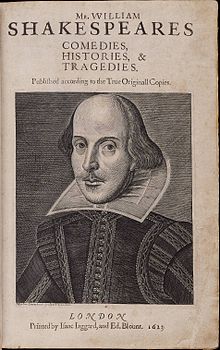all the world's a stage
Appearance
English
[edit]

Etymology
[edit]Coined by the English playwright William Shakespeare (baptized 1564; died 1616) from the beginning of a monologue delivered by the character Jaques in Act II, scene vii, of the play As You Like It, believed to have been written in 1599: “All the world’s a stage, / And all the men and women, meerly Players; […]”.
Pronunciation
[edit]Audio (General Australian): (file)
Proverb
[edit]- People have roles to play in life just as actors do in the theatre.
- 1766 May, “An Occasional Prologue and Epilogue, Compos'd for the Agreeable Surprize, a Comedy, Translated from the Comic Pieces of Mons[ieur] de Marivaux, and of the French Academy; and Perform'd, with Universal Applause, by the Young Gentlemen of Mr. Rule's Academy at Islington, for Whitsuntide, 1766, in the Presence of their Parents and Friends”, in The Jester's Magazine: Or, The Monthly Merry-maker, London: Printed and sold by S. Bladon, in Pater-noster-Row; J. Williams, in Fleet-Street; and J. Kingman, near the Royal-Exchange, published 1767, →OCLC, page 240:
- But ſtill, perhaps, 'tis ſomewhat new you'll ſay, / For School-Boys to attempt to act a Play. / Why ſhould the Attempt ſurprize! it ſuits our Age, / And more you know, that all the World's a Stage. / Of general Uſe indeed muſt ſeem this Art, / Since every Man was born to act his Part.
- 1972 November 17, Tom Prideaux, “All Heart and No Place to Go: Dude [theater review]”, in LIFE, volume 73, number 20, Chicago, Ill.: Time Inc., →ISSN, page 30:
- Now we meet singers who depict Earth, Moon, Bread, and a pair of actors, played gamely by William Redfield and Rae Allen, who were meant to promote the notion that all the world's a stage. […] The saying that all the world's a stage is true enough. But it doesn't follow conversely that the stage is the world. The stage is more demanding than the world, and its rules are even harsher. As Dude proves, it can't get by on good intentions.
- 2005, R. J. Burke, The Cigarette Killer: A Novel, New York, N.Y.: iUniverse, →ISBN, page 249:
- "Joey, my husband, was torn between the stage and the law," Mari's mother said. "I don't know which one won and which lost." / "My dear, you know that all the world's a stage. Boards or bench. I'll get the drinks."
- 2006, Nicholas [Peter] Ridout, “Embarrassment: The Predicament of the Audience”, in Stage Fright, Animals, and Other Theatrical Problems (Theatre and Performance Theory), Cambridge: Cambridge University Press, →ISBN, pages 93–94:
- This is not simply to rehash the rather meaningless notion that all human behaviour is performance, or even that ‘all the world’s a stage’, but instead to suggest that there is something in the appearing that takes place in the theatre that seems capable of activating in an audience a feeling of our compromised, alienated participation in the political and economic relations that make us appear to be who we are.
- 2014, Mo Yan, translated by Howard Goldblatt, Frog, London: Hamish Hamilton, →ISBN:
- We live in a civilised society, and in a civilised society everyone is an actor – film, TV, drama, crosstalk, sketch – we're all acting. Don't they say that all the world's a stage?
Translations
[edit]people have roles to play in life just as actors do in the theatre
|
References
[edit]- ^ William Shakespeare (1623) Mr. William Shakespeares Comedies, Histories, & Tragedies: Published According to the True Originall Copies[1], London: Printed by Isaac Iaggard, and Ed[ward] Blount, →OCLC.
- ^ First Folio, page 194.
Further reading
[edit] all the world's a stage on Wikipedia.Wikipedia
all the world's a stage on Wikipedia.Wikipedia
